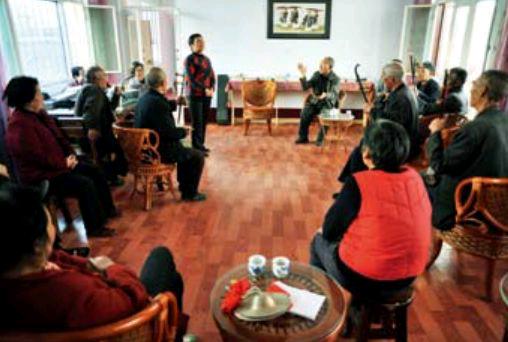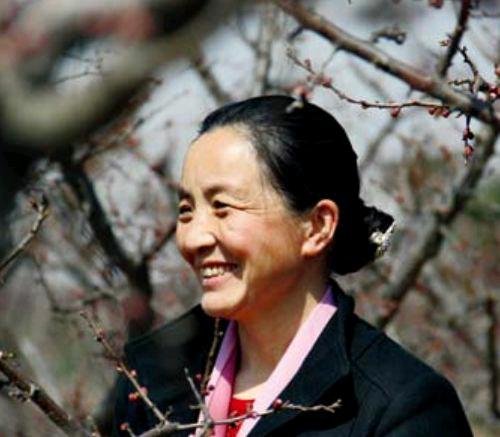Zheng Bing: The Farming Godmother
2014-11-24
Amidst the vast land of China, Zhaizi is hardly more than a nondescript village in Puzhou Town, Shanxi Province. However, it is where Chinas first farmersassociation was born. Since 1998, its founder, Zheng Bing, has spent 16 years transforming the village into a model for an integrated cooperative of farmers. She is now director-general of Puhan (Puzhou-Hanyang) Rural Community.
Dance Team to Farmers Association
Zheng Bing may still be teaching in a local primary school if not for a quarrel with a villager. In 1998, Zheng and her husband were operating a fertilizer retail store in Zhaizi Village. One day, a villager came to buy chemical fertilizer. Learning that the villager intended to spend 800 yuan for chemicals for a less-than-half-acre field, Zheng advised him that 300 yuan of fertilizer was plenty. However, the villager wasnt interested in Zhengs opinion and a heated argument erupted.
Such glaring waste due to lack of knowledge inspired an idea: Why not invite agricultural experts to lecture to farmers? With the help of a chemical fertilizer producer, she invited a professor from Northwestern Agriculture University to give a lecture to villagers. The event attracted more than 400 farmers. Afterwards, many asked Zheng to organize further lectures. However, this would require time and energy investment she wasnt sure she could make. So, Zheng quit her teaching job in 1999 to dedicate herself to organizing agricultural technology training.
Soon, one phenomenon caught Zhengs attention: Housewives attending training classes still had little influence on decisions made at home. Zheng realized that it was because traditional gender concepts oppress female voices. How could one woman possibly hope to fix such a situation? Zheng recalled seeing women dancing in the streets of Wuhan during a visit to the city in 2001. She decided to teach local women to dance. The activity gradually changed local philosophies and promoted public awareness and female solidarity. Zheng began thinking that the farmers would also benefit from organized activities.
In 2004, Zheng Bing registered Yongji Puzhou FarmersAssociation with the civil affairs department, the first of its kind in China. In 2007, it was renamed Yongji Puzhou Fruit Association. Currently, it includes more than 40 cooperatives, with 25,000 members across 4,000 households in Puzhou and Hanyang towns. For this reason, Zheng Bing named it Puhan Rural Community.
Economic Cooperative to Public Services
Initially, the association merely conducted activities such as agricultural training and organizing villagers to build roads. Not until 2006 did it begin to set foot in realms of economics. That year, it established eight economic cooperatives, but all failed within a year. Zheng Bing attributed the failure to the old age of the members of the associations management team. Thus, they began to inspire younger people to return home. In 2008, as the first group of returning young people joined the association, Puhan Rural Community lifted off.
Land is the foundation of farming. “A farmer without land to till isnt a farmer,” remarks Zheng Bing. “Land nurtures the crops feeding mankind, and its survival is even more important than human existence. Land supplies life to people, and it represents the dignity of farmers.” For this reason, agriculture is the top priority of the development of Puhan Rural Community.
In 2008, the community began to promote organic agriculture. It mobilized 380 households to plant organic cotton. After three years of endeavors, Puhan Rural Community expanded their organic cotton fields to more than 600 hectares. It signed a cotton sales contract with a Hong Kong company. Farmers received payment according to the size of their land. In this way, not only did the rural community achieve mechanized production of organic crops, but it also made low-cost transactions with major cities through cooperating with established companies. In addition to organic agriculture, Puhan Rural Community also sponsors economic cooperatives such as agricultural materials chain supermarkets, womens handicraft cooperatives, and a Youth Farm. Since 2010, the communitys GDP has seen an annual growth rate of more than 20 percent.
Growing incomes enable the community to reinvest funds into public services such as education and senior care. Many empty nesters reside in Puhan Rural Community. The farmers associa- tion rented a house and converted it into a place for daytime senior social activities. “Most rural seniors prefer to stay in their villages over government-built nursing homes,” explains Zheng Bing. “Both are necessary. They meet different demands of different groups.”
Chinese-style Integrated Cooperative
Puhan Rural Community has become a multi-functional farmers cooperative integrating bulk agricultural product circulation, organic farming, agricultural materials purchasing, handicraft production and sales, a credit union, medical care, pension services, waste management, and community education.
The concept of integrated farmers cooperatives, rural economic and social organizations, was born in Japan in the 20th Century, and quickly spread to South Korea and Taiwan. They are legally established and integrate such functions as finance, business, culture, and social management, aiming to protect rural residents right to enjoy and share market benefits. Zheng Bings Puhan Rural Community is exactly in line with the concept.
Puhan Rural Community unites individual rural households not only to compete in a tough market, but also to build a livable community in which all members coexist in harmony. “This is a Chinese-style integrated farmers cooperative,” asserts Yang Tuan, a research fellow at the Institute of Sociology under Chinese Academy of Social Sciences. “The community has achieved cooperation not only in agricultural production and sales, but also in daily life. In fact, the farmers association has served as an organizer and manager to ensure local farmers equally enjoy public services and maintain the communitys social order.”
Although China has become the worlds second largest economy, rural residents still represent the majority of its population, and some rural areas remain underdeveloped. In this context, solving the countrys rural problems urgently requires the establishment of new economic and social organizations capable of integrating resource allocation and rural system reform. Such organizations not only bring substantive benefits to farmers, but also improve public services in rural areas, so as to radically strengthen rural residentsability to solve their own problems and internally maintain social order.
To date, the self-organized mode of Puhan Rural Community has proven successful both economically and socially. Despite the fact that such a mode may not be applicable everywhere, it is still considered an innovative social management system independently invented by farmers to protect and revive rural areas in the process of Chinas urbanization.
